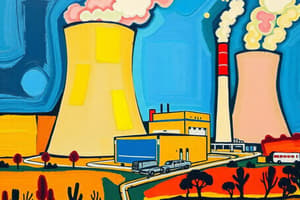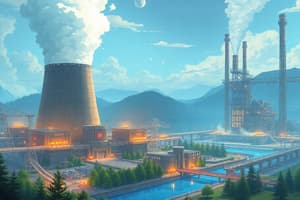Podcast
Questions and Answers
What is the main global challenge related to nuclear energy, as discussed in the text?
What is the main global challenge related to nuclear energy, as discussed in the text?
- Exploring novel ways to recycle nuclear fuel
- Increasing efficiency rates of advanced reactors
- Ensuring safe handling and disposal of radioactive waste (correct)
- Promoting innovation in nuclear energy design
What do advancements in design and construction techniques lead to in nuclear energy?
What do advancements in design and construction techniques lead to in nuclear energy?
- Development of advanced reactors with higher efficiency rates (correct)
- Reduction in the need for regulatory oversight
- Exploration of renewable energy sources
- Decrease in radioactive waste generation
How can recycling nuclear waste help address a global issue mentioned in the text?
How can recycling nuclear waste help address a global issue mentioned in the text?
- By minimizing risks posed to human health and the environment
- By reducing the volume of waste accumulating globally (correct)
- By increasing the efficiency rates of nuclear reactors
- By eliminating the need for storage and disposal guidelines
What is emphasized as crucial steps for fully realizing nuclear energy's potential in the text?
What is emphasized as crucial steps for fully realizing nuclear energy's potential in the text?
Which factor has led to the development of next-generation nuclear plants according to the text?
Which factor has led to the development of next-generation nuclear plants according to the text?
What makes nuclear energy promising in the context of climate change and environmental degradation?
What makes nuclear energy promising in the context of climate change and environmental degradation?
What is the primary benefit of nuclear energy mentioned in the text?
What is the primary benefit of nuclear energy mentioned in the text?
In nuclear reactors, the heavy isotopes used for controlled chain reactions include which of the following?
In nuclear reactors, the heavy isotopes used for controlled chain reactions include which of the following?
What is converted into energy during the nuclear reactions inside reactor cores?
What is converted into energy during the nuclear reactions inside reactor cores?
How does the heat released from nuclear reactions in reactor cores contribute to electricity generation?
How does the heat released from nuclear reactions in reactor cores contribute to electricity generation?
Which country has notably decreased greenhouse gas emissions by utilizing nuclear energy for electricity production?
Which country has notably decreased greenhouse gas emissions by utilizing nuclear energy for electricity production?
Compared to traditional fossil fuels, nuclear energy produces electricity with ____ greenhouse gas emissions.
Compared to traditional fossil fuels, nuclear energy produces electricity with ____ greenhouse gas emissions.
Flashcards are hidden until you start studying
Study Notes
Conventional Sources of Energy: Exploring Nuclear Power
In our ongoing quest for reliable and sustainable forms of energy, we turn our focus towards nuclear power, one of the most significant conventional energy resources known today. This form of energy has been shaping our world's progress since its discovery during World War II when scientists harnessed the enormous potential hidden within atomic nuclei.
Nuclear reactors utilize controlled chain reactions between heavy isotopes such as uranium-235 (({}^{235})U) and plutonium-239 (({}^{239})Pu). During these reactions, a small fraction of the mass of the fuel material is converted into energy. This process takes place inside large, specially designed vessels called reactor cores. The heat released from this process drives steam generators, which produce high pressure steam used to generate electricity through turbines connected to electric generating units.
The benefits of nuclear energy lie primarily in its ability to meet huge demands with relatively minimal greenhouse gas emissions compared to traditional fossil fuels like coal and natural gas. On average, a single reactor can supply enough electricity to power several million homes without producing any carbon dioxide directly. Furthermore, it is worth noting that countries like France have managed to decrease their overall greenhouse gas emissions significantly by utilizing nuclear energy as a major source for electrical generation.
However, concerns regarding safety and waste disposal persist due to the powerful forces unleashed by splitting atoms, making the industry highly regulated. Storage and disposal of spent radioactive materials, also known as radioactive waste, remains a global challenge. Governments and international organizations worldwide continuously work on improving guidelines and best practices to ensure safe handling, transportation, storage, and eventual disposal of these materials while minimizing risks posed to human health and the environment.
Technological advancement hasn't left nuclear energy behind. Innovations in design and construction techniques have led to the development of advanced reactors capable of achieving higher efficiency rates and improved safety standards. These next-generation plants will pave the way for increased contributions to meeting future energy needs sustainably. Additionally, exploring novel ways to recycle nuclear waste could help reduce the volume of waste accumulating globally.
Overall, nuclear power offers immense promise toward creating a cleaner, more secure energy landscape. However, addressing lingering challenges, promoting innovation, and ensuring responsible management remain crucial steps for fully realizing nuclear energy's full potential in our fight against climate change and environmental degradation.
Studying That Suits You
Use AI to generate personalized quizzes and flashcards to suit your learning preferences.




